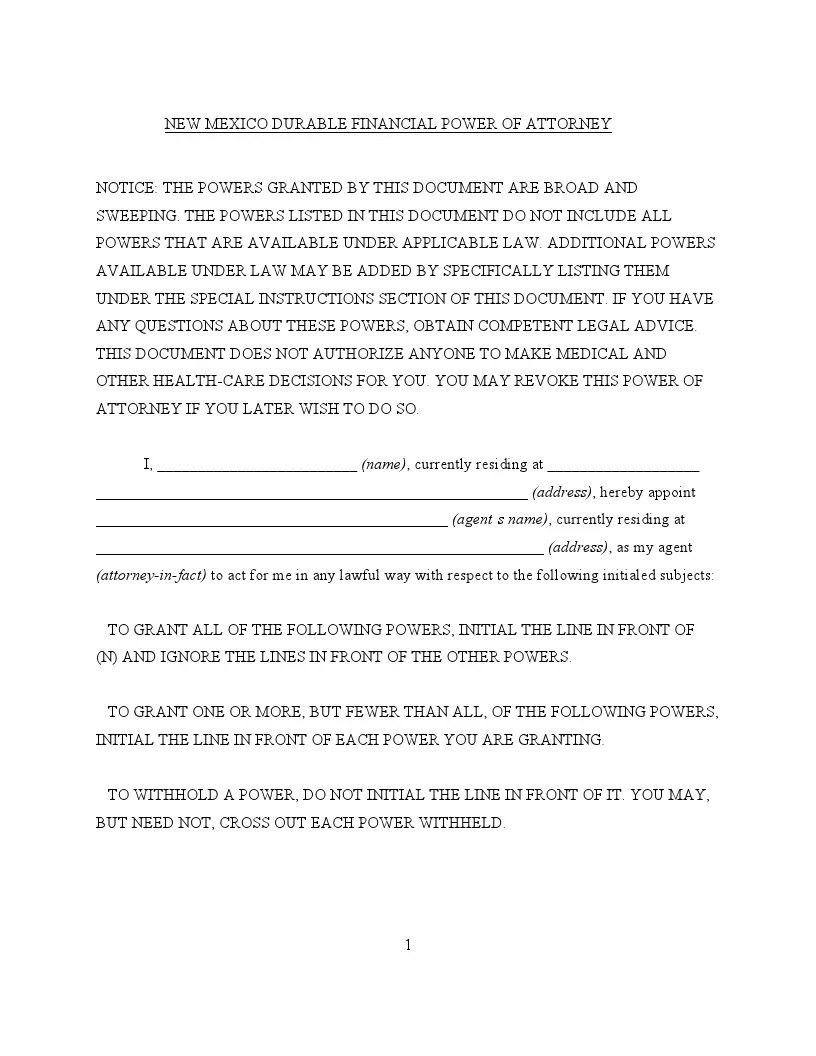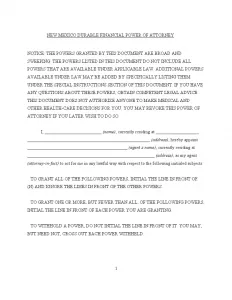Free New Mexico Durable Power of Attorney Form
The New Mexico durable power of attorney is a legal document that allows an individual, referred to as the “principal,” to appoint another person, known as the “agent” or “attorney-in-fact,” to manage their financial affairs. This form is “durable,” meaning it remains effective even if the principal becomes incapacitated or unable to make decisions themselves.
This power of attorney can include a wide range of powers, such as handling banking transactions, managing real estate, and making investment decisions. The principal can specify the agent’s powers and place limits if desired.
The key feature of this form is its durability — it continues to be in effect during the principal’s incapacity, which is crucial for uninterrupted financial affairs management. To be valid in New Mexico, a durable power of attorney must be completed under state laws, which include requirements for how it must be signed, witnessed, or notarized.
On FormsPal, you can find various New Mexico POA forms to suit different legal needs, ranging from health care decisions to financial management.

Build Your Document
Answer a few simple questions to make your document in minutes
Save and Print
Save progress and finish on any device, download and print anytime
Sign and Use
Your valid, lawyer-approved document is ready
New Mexico Signing Requirements and Laws
The New Mexico Annotated Statutes detail the requirements and laws surrounding executing a durable power of attorney. According to Section 45-5B-104, a POA is considered durable unless it explicitly states that it will terminate if the principal becomes incapacitated.
For the execution of a power of attorney, as per Section 45-5B-105, the document must be signed by the principal or by someone else in the principal’s conscious presence and at their direction. The signature is considered genuine if the principal acknowledges it before a notary public or legally authorized individual.
Section 45-5B-109 specifies that a power of attorney becomes effective immediately upon execution. However, the principal can designate that it becomes effective at a future date or upon a specified event. In cases where the POA activates upon the principal’s incapacity and no specific individual is authorized to declare the principal incapacitated, a physician, licensed psychologist, lawyer, judge, or appropriate governmental official must make this determination.
Under Section 45-5B-110 of the New Mexico Statutes, a power of attorney terminates when the principal dies, revokes the document, or achieves the POA’s intended purpose. Additionally, the agent’s authority ends upon their death, incapacity, resignation, or if the principal revokes it.
New Mexico Durable Power of Attorney Form Details
| Document Name | New Mexico Durable Power of Attorney Form |
| Other Names | New Mexico Financial Durable Power of Attorney, NM DPOA |
| Relevant Laws | New Mexico Annotated Statutes, Section 45-5B-105 |
| Signing Requirements | Notary Public |
| Avg. Time to Fill Out | 10 minutes |
| # of Fillable Fields | 37 |
| Available Formats | Adobe PDF |
Popular Local Durable POA Forms
Durable POA documents are used in each and every state. Take a look at other popular DPOA forms frequently filled out by Americans.
Steps to Complete the Form
By following these steps, you can effectively set up a durable power of attorney in New Mexico that ensures your affairs are managed according to your wishes, even if you cannot manage them yourself.
1. Designation of Agent
Begin by identifying yourself as the principal and then designate your chosen agent. Fill in your full name where indicated, and then provide the name, address, and telephone number of the person you appoint as your agent.
2. Designation of Successor Agents
If you want to appoint successor agents who will take over if your primary agent is unable to serve, you can do so in this section. Provide the names, addresses, and telephone numbers for each successor agent.
3. Grant of General Authority
Indicate which powers you grant to your agent by initialing next to the specific authorities listed on the form. These include handling real property, financial institutions, and more. You can initial “All Preceding Subjects” if you wish to grant all listed powers.
4. Grant of Specific Authority
This section allows you to grant significant powers to your agent that can impact your estate substantially. Initial next to each specific authority you want to grant, such as making gifts or changing beneficiary designations.
5. Special Instructions
Here, you can provide specific instructions not covered elsewhere in the form. It could include limitations or additional powers you wish to grant your agent.
6. Effective Date and Nomination of Conservator or Guardian
Specify when a power of attorney will become effective. If you want it to be effective immediately, state that here. Additionally, you can nominate a person to serve as a conservator or guardian if necessary.
7. Signature and Acknowledgment
After reviewing the form to ensure all information is correct and reflects your wishes, sign and date the form in the presence of a notary. Also, fill in the printed name, address, and telephone number sections.
8. Notarization
The last part is to have the form notarized. This step involves signing the document in front of a notary public, who must also fill in their parts of the form, verify that you are the principal, and acknowledge your signature.

Listed here are various other New Mexico documents filled out by our users. Try our step-by-step builder to customize these forms to your needs.
Download a Free New Mexico Durable Power of Attorney Form
